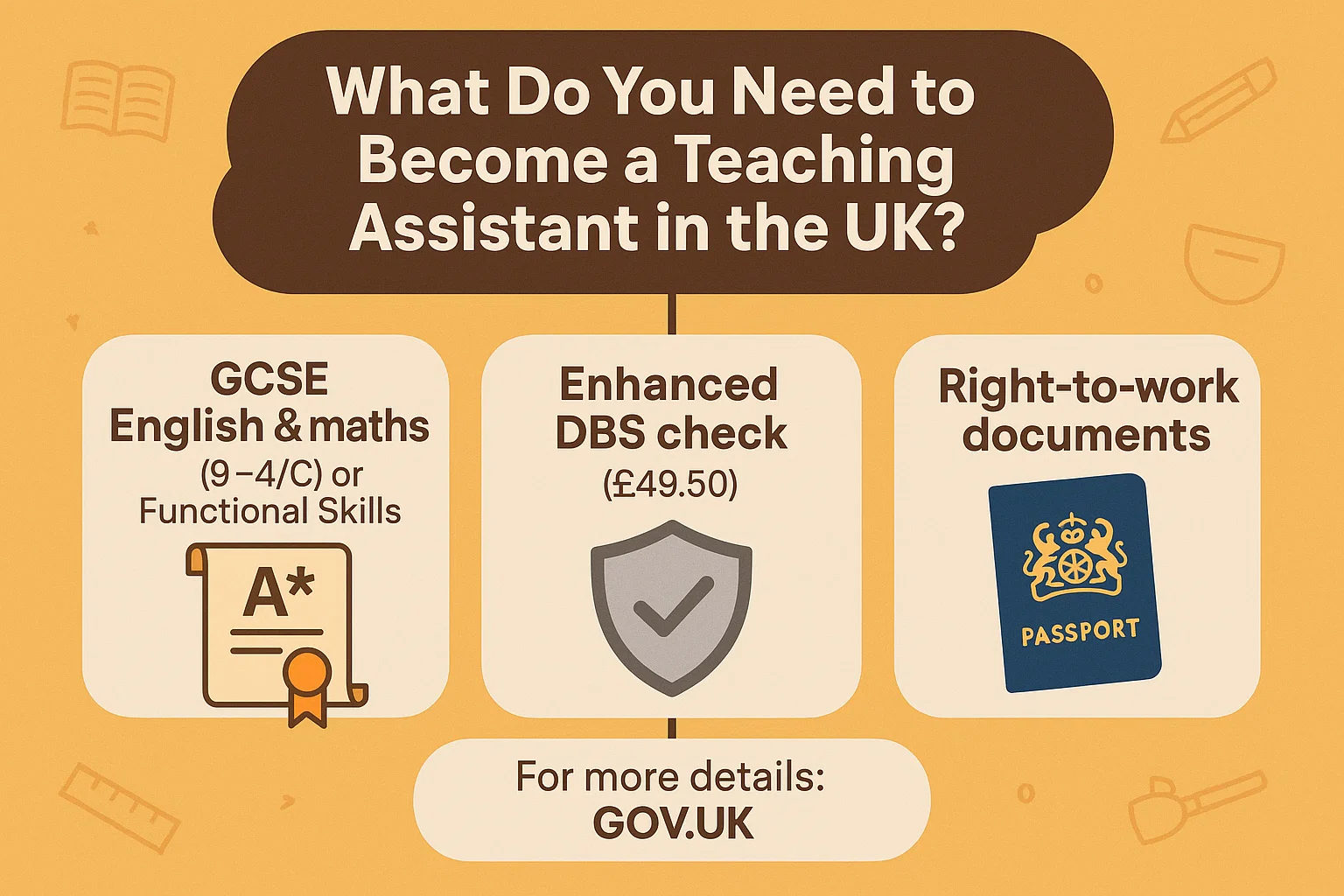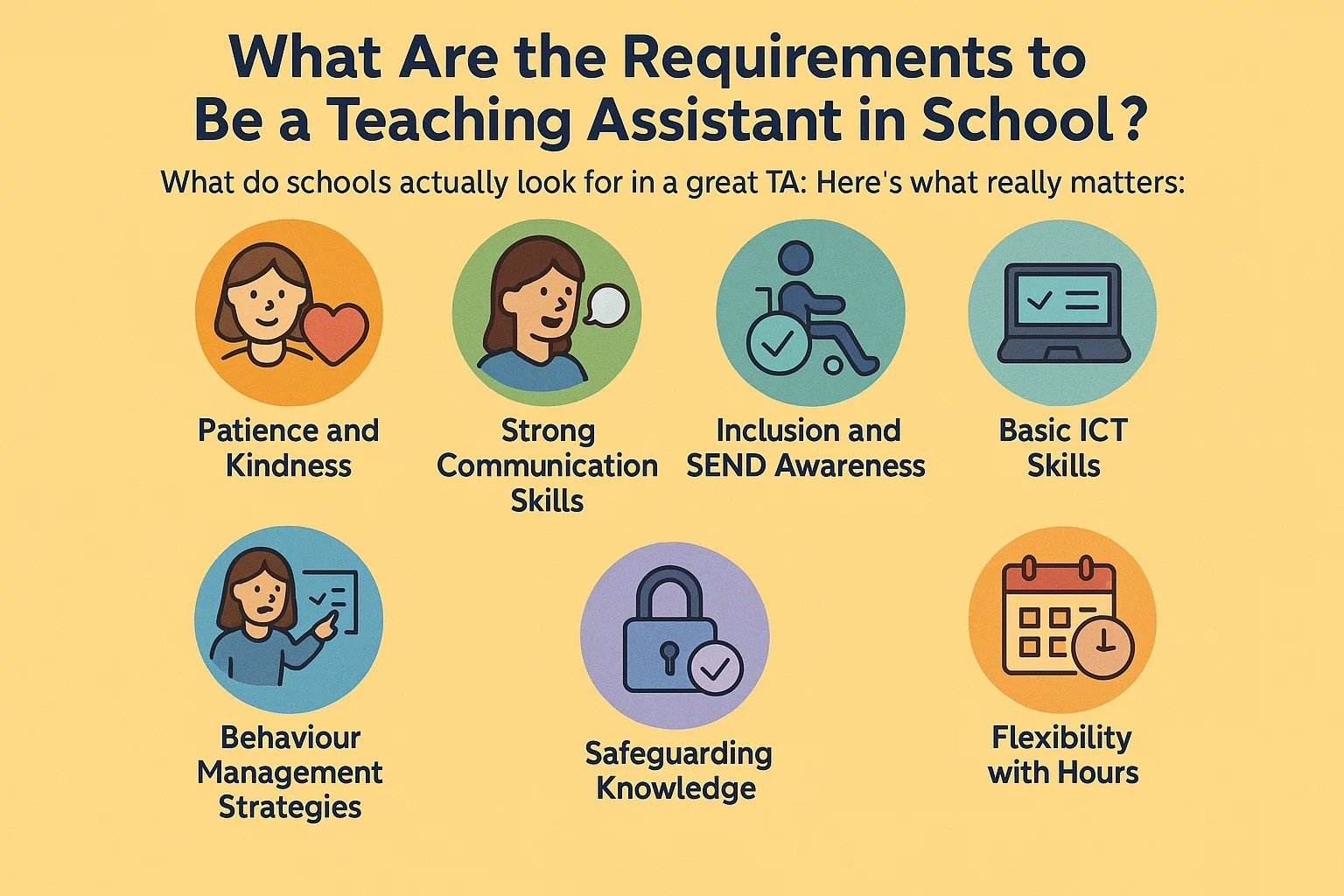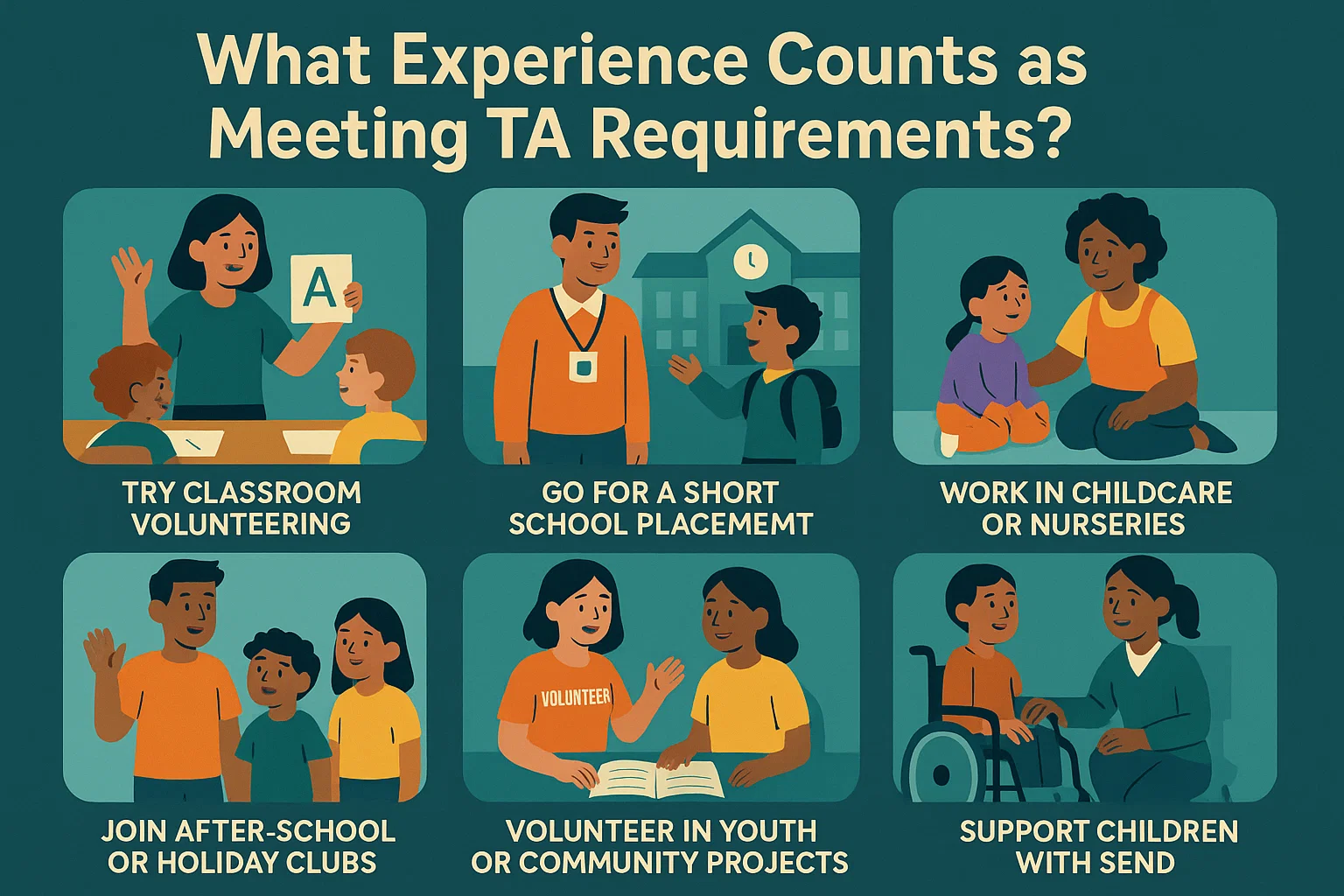No products in the cart.
Thinking about working in schools? Well, you’re in the right place! This 2026 guide shows first-time applicants exactly how to meet the requirements to be a teaching assistant and kickstart their career in the UK. First, you’ll need a few essentials: GCSE English & maths (9–4/C) or Functional Skills, an enhanced DBS (£49.50, Update Service £16/year), and the right-to-work ID.
Then, you’ll complete a KCSIE safeguarding induction on your first day. Next, if you want to get started quickly, try a quick Level 2 or Level 3 course, or the Level 3 apprenticeship, where you can earn while you learn. Remember, many roles are term-time only, so pay is pro-rata.
What Do You Need to Become a Teaching Assistant in the UK?

So, you’re ready to step into a classroom—but what do you actually need? Don’t worry, it’s pretty straightforward! First, schools want you to have:
- GCSE English & maths (9–4/C) or Functional Skills – the basics to handle reading, writing and numbers like a pro.
- Enhanced DBS check – because safety comes first! (£49.50 from 2 Dec 2024). Plus, the optional DBS Update Service (£16/year) keeps it current if you move between jobs.
- Right-to-work documents – like a passport or Share Code, to show you can legally work in the UK.
Once you’ve got these essentials, you’re already on your way. For more details, GOV.UK and the National Careers Service have the full scoop to dive deeper.
What Qualifications Help You Get a Teaching Assistant Job?
So, you’ve got the basics—what’s next? Well, having the right qualifications can really help you land a job. First, a Level 2 or Level 3 Supporting Teaching & Learning certificate gives you the skills schools actually look for. Or, you could do the Level 3 Teaching Assistant apprenticeship, where you earn while you learn—it usually takes about 18 months plus a short final assessment.
Also, short courses in safeguarding, first aid, autism/ADHD, or phonics can shine your CV and show schools you care. Later, once you’ve gained experience, you can go for HLTA, which is like the next level in your TA career.
Check out the Level 2 Award in Support Work in Schools and Colleges from the Open learning Academy for a plus point.
Can You Work as a TA Without Qualifications?
You might wonder, “Do I need qualifications to start?” The good news is… no! Many schools and multi-academy trusts (MATs) offer entry-level TA jobs and Level 3 apprenticeships where you can earn while you learn.
Furthermore, volunteering or doing a short school placement is a great way to show you’ve got what it takes before your first interview. In fact, these hands-on experiences are exactly what the National Careers Service recommends for getting your foot in the door.
Want the full step-by-step guide on becoming a teaching assistant? Read our detailed blog, How Do I Train to Become a Teaching Assistant? to start your journey today!
What Are the Requirements to Be a Teaching Assistant in School?

What do schools actually look for in a great TA? Here’s what really matters:
- Patience and kindness – because every child learns at their own pace.
- Strong communication skills – easily connecting with students, teachers, and parents.
- Teamwork and organisation – since you’ll often work closely with teachers and help keep the classroom running smoothly.
- Inclusion and SEND awareness – understanding how to support children with special educational needs or disabilities.
- Behaviour management strategies – staying calm, positive, and confident even on hectic days.
- Basic ICT skills – using digital tools to help with lessons or admin tasks.
- Safeguarding knowledge – always keeping student safety as your top priority.
- Flexibility with hours – most TA roles are term-time only, ranging from around 16 to 37 hours per week.
With these skills in your toolkit, you’ll be ready to make a real difference and bring warmth, patience, and positivity to every classroom you enter!
Do You Need a DBS Check to Work as a Teaching Assistant?
So, can you start as a teaching assistant without a DBS check? The answer is no! Since you’ll be working with children, you need an enhanced DBS check. Right now, the cost is £49.50, but volunteers don’t pay a thing.
Plus, there’s an optional DBS Update Service for £16 a year, which keeps your check valid if you move between roles. This way, you don’t have to get a new DBS every time you start a new job—super handy!
What Experience Counts as Meeting TA Requirements?

Curious about what experience helps you become a teaching assistant? The more hands-on you are, the better! Schools love seeing that you’ve spent time with children and know what classroom life is like.
-
Try Classroom Volunteering
To begin with, spending just a few hours a week in a classroom can teach you so much. You’ll see how teachers and TAs work together, manage groups, and keep lessons fun and calm. Plus, it’s a lovely way to build confidence before you apply for paid roles.
-
Go for a Short School Placement
Next, consider doing a short school placement. These are often part of a course or apprenticeship and are perfect for gaining real experience while learning. You’ll get helpful feedback, grow your skills and maybe even earn glowing references from teachers for future job applications.
-
Work in Childcare or Nurseries
Similarly, working with younger children helps you understand how they learn and play. Plus, it’s a wonderful way to build patience, creativity, and energy—all qualities every great TA needs!
-
Join After-School or Holiday Clubs
In addition, helping children with homework or creative activities shows you can engage them and keep things organised. These roles often teach you classroom-style management in a fun, relaxed setting.
-
Volunteer in Youth or Community Projects
Moreover, if you’ve supported kids through sports, arts, or youth clubs, that counts too! Schools love people who show teamwork, empathy, and care beyond the classroom.
-
Offer Tutoring or Reading Help
On top of that, tutoring one-on-one or in small groups is a fantastic way to show that you can focus on each child’s individual learning needs. It’s a hands-on, rewarding, and brilliant experience for your CV.
-
Support Children with SEND
Finally, if you’ve worked with children who have special educational needs or disabilities, that’s a huge plus. It shows you’re patient, understanding, and adaptable—qualities that schools really value.
In short, every bit of experience counts! Helping at a school, club, or community group builds confidence and shows you’re ready to make a real difference.
Do Requirements Change by School or Location?
So, do the rules for becoming a teaching assistant change depending on where you are? Well, kind of! For instance, in England and Wales, you’ll need a DBS check, while in Scotland, it’s the PVG Scheme (join fee £59, existing member £18 per check).
Plus, academies can set their own HR rules, but they still follow KCSIE and safer recruitment law. Meanwhile, local authority (LA) schools stick to local policies and national guidance. In short, the basics are the same everywhere, but a few details can vary depending on the school or location.
How Can You Stand Out as a Teaching Assistant?
Even if you meet the requirements to be a teaching assistant, it’s a competitive field. For starters, showing initiative, patience, and adaptability in your CV or during interviews really helps. Next, completing extra short courses like first aid, SEND awareness or phonics can make you shine. Moreover, having experience with behaviour strategies or working with children with additional needs demonstrates you’re ready for real classroom challenges. In short, schools love applicants who show both skill and heart.
FAQs
What qualifications do I need to be a teaching assistant?
GCSE English & maths (9–4/C) or Functional Skills, enhanced DBS, and right-to-work ID. Level 2/3 courses or apprenticeships help.
Can I be a TA without qualifications?
Yes! Entry-level jobs and Level 3 apprenticeships let you earn while you learn, and volunteering counts too.
How long does it take to train to be a teaching assistant?
Level 2/3 courses take a few months; Level 3 apprenticeships take ~18 months plus a short assessment.
How much is a TA qualification?
Level 2/3 courses cost a few hundred pounds; apprenticeships are usually free.
How much is a TA salary per hour?
Typically £12–£15/hour (term-time, pro-rata).
Are there any free teaching assistant courses?
Yes! Some colleges, councils, and apprenticeships offer free courses, and you can earn while you learn.
Final Thoughts
By now, you know the requirements to be a teaching assistant! First, gather your GCSE or Functional Skills evidence to show schools you’ve got the basics. Then, get your enhanced DBS (£49.50; Update Service £16/year) sorted—safety first! Next, pick your entry route, whether it’s a quick Level 2/3 course or the Level 3 apprenticeship (~18 months). After that, make sure your right-to-work documents are ready and line up two references to make applying via LA or MAT portals much easier. Finally, once you’ve done all this, you’ll be ready to step confidently into a classroom, support children, and kickstart your TA career. Remember, every small step counts!
Excited to start your TA adventure? Dive into the Teaching Assistant Course at Open Learning Academy and take your first step towards a rewarding classroom career today!




